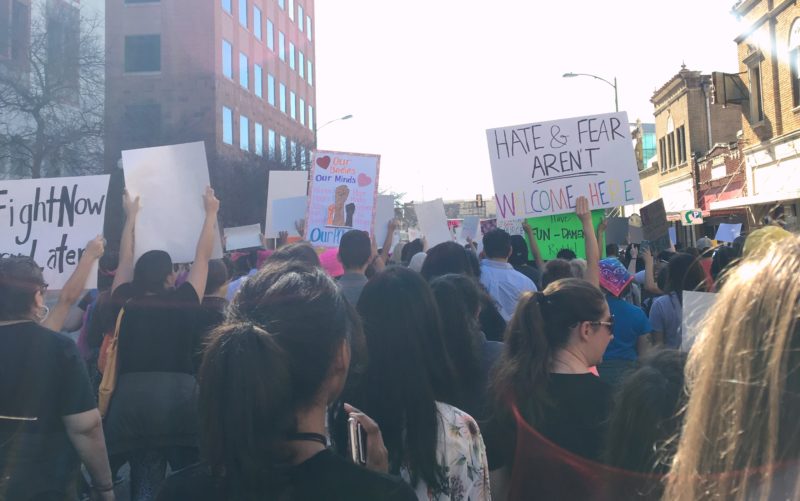Walks in San Antonio and Austin offer students chances to stand in solidarity with minorities
On Jan. 21, people across the nation will attend a Women’s March to exhibit their commitment to human rights, both locally and globally. Trinity students have joined the campaign and will attend marches in San Antonio and Austin to show their support.
For many, the march symbolizes unity amongst minorities. Despite gender, ethnicity, race or creed, people are gathering as concerned citizens to react to injustice in our nation.
“I am going because on Jan. 20, a bigot who has insulted and belittled the struggles of women, African Americans, the LGTBQ community, immigrants, Muslims, people with disabilities, POWs and more will take power in the most prized seat our country offers. I will be marching to show people that many of us do not agree with him and will not sit idly by while people’s freedoms are taken away from them,” said Ellen Hart, one of Trinity’s students who will be attending the march in San Antonio.
Because the march brings together many, people see it as a chance to stand up for minorities. Rather than remaining apathetic about a situation that affects the whole nation, marchers will demonstrate their reluctance to resign.
“This march signifies to me that we are standing together. We will not be quiet in the face of wrongdoing and will have each other’s backs no matter what groups we belong to,” Hart said.
Hart sees her participation in this march as an act against hate and oppression. She stands firm with the decision to advocate for those who are need of support and the decision not to remain silent.
“I think this is the most important thing I could be doing. Many minorities are scared, as they have a right to be. By marching, we are showing them that we have their backs; we will not allow the rights of the people of America to be taken away,” Hart said.
Though the mission of the march may be misconceived as a protest of gender inequality, it encompasses more than just gender. Participants march against inequalities of race, religion and sexuality.
“I really like this march in particular because it focuses on the intersectionality that women face. We’re not just marching for women, but we’re marching for women of color because we recognize that they face more obstacles. We’re marching for trans-women and queer women,” said Stacey Debner, a sophomore who will be attending the march in Austin.
The march intends to join women in diversity despite the negative rhetoric of recent politics. Those who participate stand together to fight the insulting and threatening nature of powerful figures.
“I feel like a lot of it was spurred by the misogynistic discourse that we have with our president-elect, so I think it makes a really big statement about our views on misogynistic discourse in politics, especially now that our president has such a record of misogyny,” Debner said.
The negative political atmosphere has prompted many students to become more active because they believe a change is needed desperately. Oumoul Setamou, a sophomore attending the march in San Antonio, agrees.
“I feel like it’s important to be proactive and active in a time like this. As an African-Muslim woman of color, I was really discouraged by the election and in a pretty big slump for a while, but I realized that in a time like this I need to be more visible than ever,” Setamou said.
Setamou expressed nervousness about attending the march due to the biased discourse in the United States. However, she decided attending the march was a great way to stand against the hatred.
“For me, the message is resilience and visibility. As a member of a marginalized group and knowing so many dear people in my life are a part of already small, marginalized and invisible places, it has become difficult, in light of everything that has been said, to remain resilient and visible. But, I have come to understand that our power and strength comes from continuing to live our lives and assert that we belong here just as much as anybody else,” Setamou said.
Though the label of “feminist” may be misconstrued as a form of negative rebellion, the people who participate in marchers like this one are attempting to give the stigmatized word a more positive definition that represents its true intent. However, Debner remarks that marches are only the beginning of such a change.
“I feel like we’re getting to a place where people are more understanding, but that’s going to take more personal discourse. A big march protests bigger ideas, bigger things “” like politics. If you really want to have understanding on a personal level, that has to come through intercommunication,” Debner said.
Women’s Marches will be held across the nation on Sunday. The marches intend to promote unity and equality and are protesting negative voices in politics. The San Antonio march will begin at City Hall at 11am.







